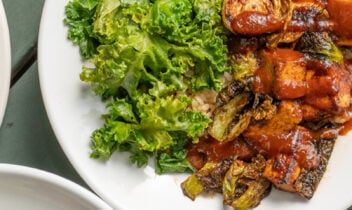TheBUZZ Cruciferous vegetables lower inflammation?
WHAT THEY’RE SAYING
Eating cruciferous vegetables such as green cabbage, broccoli, kale, and cauliflower provides anti-inflammatory benefits.
HOW DO WE KNOW THIS
Researchers at Vanderbilt University Medical Center in Nashville, Tennessee examined the food intake of 1,005 healthy, middle-aged Chinese women who filled out questionnaires about their diet as part of the Shanghai Women’s Healthy Study. (Because Asian populations are known to consume large amounts of cruciferous vegetables and other plant-based foods, these questionnaires provided a unique opportunity for researchers to analyze the potential health properties of these foods.)
The findings from this study show that participants who reported eating the most cruciferous vegetables (1.5 cups per day) had substantially less inflammation than those who ate the fewest. The women who consumed the most cruciferous vegetables had, on average, 13%-25% lower levels of three (3) important inflammatory markers in their blood.*
OUR ADVICE
Fruits and vegetables are rich in the key nutrients, antioxidant vitamins, and phytochemicals needed for overall good health and disease prevention. Cruciferous vegetables such as green cabbage, broccoli, bok choy, Brussels sprouts, kale, and cauliflower provide anti-inflammatory benefits which can reduce the risk of cardiovascular disease and other chronic diseases.
5 Ways Cruciferous Vegetables May Fight Inflammation
- Fruits, vegetables, beans, and grains contain phytochemicals which provide anti-inflammatory protection.
- Certain fruits and vegetables can help ease inflammation, stiffness, and muscle soreness.
- The bromelain in pineapple may minimize joint pain and inflammation.
- Eating cherries may reduce the pain of rheumatoid arthritis.
- Compounds in celery, peppers, and carrots potentially reduce age-associated inflammation in the brain, which can result in better cognitive health.
To get the most out of your diet, enjoy a colorful variety of fruits and vegetables and fill half your plate with these healthy foods. One great combination of colorful cruciferous vegetables is green and orange (broccoli and sweet potato, Brussels sprouts and carrots, or cauliflower and carrots).
Related Info
Meal Planning
Recipes with Lots of Fruits & Veggies
* Jiang, Yu, Sheng-Hui, Xiao-Ou Shu, et.al. “Cruciferous Vegetable Intake Is Inversely Correlated with Circulating Levels of Proinflammatory Markers in Women.” Journal of the Academy of Nutrition and Dietetics, 17 March 2014 (10.1016/j.jand.2013.12.019). Accessed March 31, 2014. View Abstract
|


